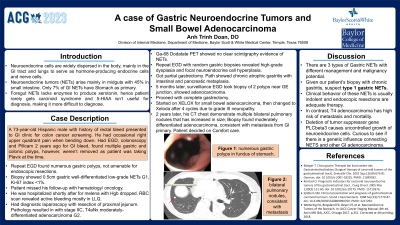Tuesday Poster Session
Category: Stomach
P4255 - Neuroendocrine Carcinoma of the Stomach and Adenocarcinoma of the Small Bowel
Tuesday, October 24, 2023
10:30 AM - 4:00 PM PT
Location: Exhibit Hall

Has Audio

Anh Trinh Doan, DO
Baylor Scott & White
Belton, TX
Presenting Author(s)
Anh Trinh Doan, DO
Baylor Scott & White, Belton, TX
Introduction: Carcinoid is used to described well-differentiated neuroendocrine tumors (NETs) that originate most commonly from gastrointestinal tract, especially midguts. They usually lead to carcinoid syndrome including diarrhea, and flushing. However, NETs of foregut, are a rare, uncommonly produce those symptoms and have poor prognosis.
Case Description/Methods: 73-year-old Hispanic male with history of rectal bleed, anemia and severe coronary artery disease presented to GI clinic for colon cancer screening. He had occasional right upper quadrant pain when bends down, no constipation, diarrhea, fever, chill or flushing. He had a recent colonoscopy and PillCam 2 years ago for GI bleed. Found multiple gastric and colonic polyps, however were not removed due to patient taking Plavix at the time. Repeat EGD and colonoscopy this time performed polypectomies. Pathology noted for well differentiated low grade neuroendocrine tumor (NET G1). The rest of colonic polyps resulted in tubular adenoma. He elected gastrectomy, no malignancy found.
Patient returned to hospital shortly after for melena with Hgb dropped as low as 6.5. He had 2 blood transfusion everyday for 3 days and Hgb remained 7. He underwent RBC scan, which revealed possible Left lower quadrant bleeding. Patient was asymptomatic otherwise. Surgical oncology was consulted and performed diagnostic laparoscopy with resection of proximal jejunum. Its pathology returned show adenocarcinoma, G2. He was then diagnosed with stage IIC, T4aNx moderately differentiated adenocarcinoma of small bowel.
He continued to return and follow with oncology. 2 years later, his CT chest with contrast demonstrated multiple bilateral pulmonary nodules that had increased in size. Biopsy then found moderately differentiated adenocarcinoma, consistent with metastasis from gastrointestinal primary. Tumor lacked receptors to HER2, PD-L1 and therefore immunotherapy is not approved. He was started on Irinotecan-based treatment and Xeloda.
Discussion: NETs of stomach, although rare, behave aggressive and have extremely poor prognosis. There are estimations on its genetic influence by the deletion of tumor suppressor gene PLCbeta3, causing uncontrolled growth of neuroendocrine cells. Current literature shows associations of gastric NETs and gastrinomas in setting of MEN1. There are not many cases of patients with both gastric NETs and small bowel adenocarcinoma. It would be curious to see if there is a genetic influence connecting NETs and adenocarcinoma
Disclosures:
Anh Trinh Doan, DO. P4255 - Neuroendocrine Carcinoma of the Stomach and Adenocarcinoma of the Small Bowel, ACG 2023 Annual Scientific Meeting Abstracts. Vancouver, BC, Canada: American College of Gastroenterology.
Baylor Scott & White, Belton, TX
Introduction: Carcinoid is used to described well-differentiated neuroendocrine tumors (NETs) that originate most commonly from gastrointestinal tract, especially midguts. They usually lead to carcinoid syndrome including diarrhea, and flushing. However, NETs of foregut, are a rare, uncommonly produce those symptoms and have poor prognosis.
Case Description/Methods: 73-year-old Hispanic male with history of rectal bleed, anemia and severe coronary artery disease presented to GI clinic for colon cancer screening. He had occasional right upper quadrant pain when bends down, no constipation, diarrhea, fever, chill or flushing. He had a recent colonoscopy and PillCam 2 years ago for GI bleed. Found multiple gastric and colonic polyps, however were not removed due to patient taking Plavix at the time. Repeat EGD and colonoscopy this time performed polypectomies. Pathology noted for well differentiated low grade neuroendocrine tumor (NET G1). The rest of colonic polyps resulted in tubular adenoma. He elected gastrectomy, no malignancy found.
Patient returned to hospital shortly after for melena with Hgb dropped as low as 6.5. He had 2 blood transfusion everyday for 3 days and Hgb remained 7. He underwent RBC scan, which revealed possible Left lower quadrant bleeding. Patient was asymptomatic otherwise. Surgical oncology was consulted and performed diagnostic laparoscopy with resection of proximal jejunum. Its pathology returned show adenocarcinoma, G2. He was then diagnosed with stage IIC, T4aNx moderately differentiated adenocarcinoma of small bowel.
He continued to return and follow with oncology. 2 years later, his CT chest with contrast demonstrated multiple bilateral pulmonary nodules that had increased in size. Biopsy then found moderately differentiated adenocarcinoma, consistent with metastasis from gastrointestinal primary. Tumor lacked receptors to HER2, PD-L1 and therefore immunotherapy is not approved. He was started on Irinotecan-based treatment and Xeloda.
Discussion: NETs of stomach, although rare, behave aggressive and have extremely poor prognosis. There are estimations on its genetic influence by the deletion of tumor suppressor gene PLCbeta3, causing uncontrolled growth of neuroendocrine cells. Current literature shows associations of gastric NETs and gastrinomas in setting of MEN1. There are not many cases of patients with both gastric NETs and small bowel adenocarcinoma. It would be curious to see if there is a genetic influence connecting NETs and adenocarcinoma
Disclosures:
Anh Trinh Doan indicated no relevant financial relationships.
Anh Trinh Doan, DO. P4255 - Neuroendocrine Carcinoma of the Stomach and Adenocarcinoma of the Small Bowel, ACG 2023 Annual Scientific Meeting Abstracts. Vancouver, BC, Canada: American College of Gastroenterology.
